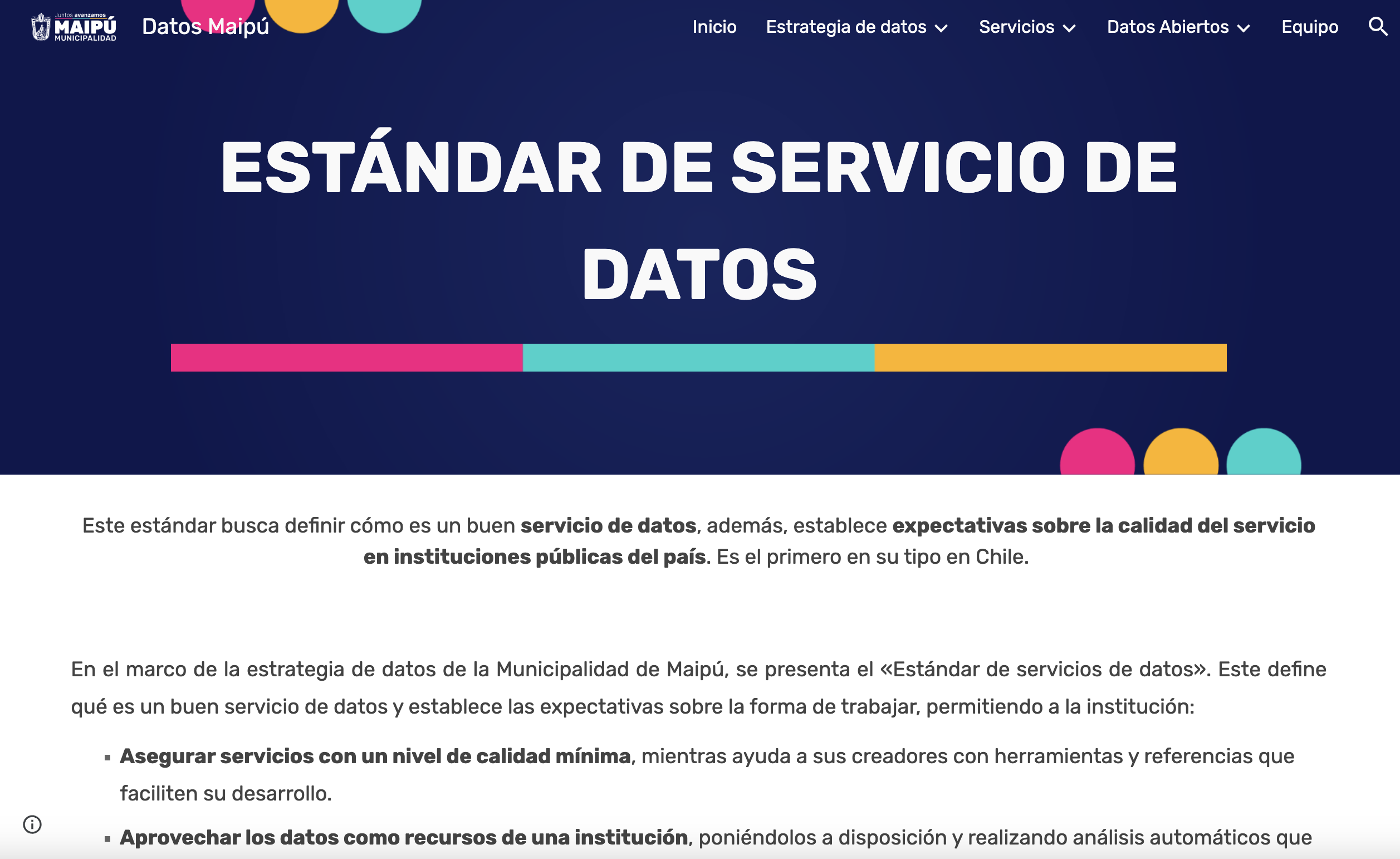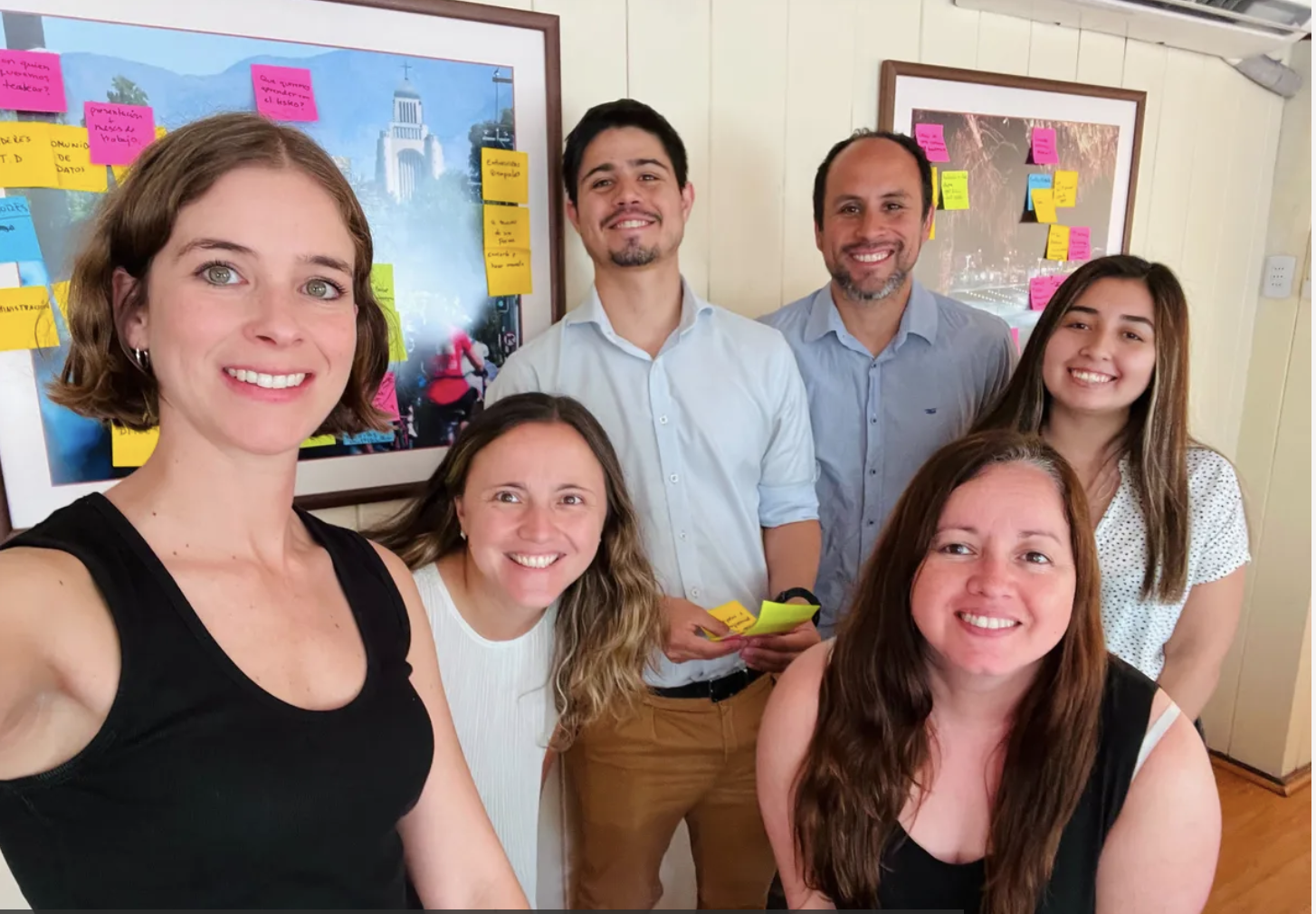Developing a Data Service Standard for Maipú
by Ignacia
Work done with Public Digital for the Municipality of Maipú (Chile) through Bloomberg Philanthropies City Data Alliance.

Developing standards has become a common practice in countries all around the world. These are important for promoting a shared understanding and ways of working bringing teams together towards what is a good service. It helps to align expectations and reach a shared vision of what teams want to achieve and how they should work. Some examples are the: UK Service Standards, Ontario’s Digital Service Standards, Rochester's Data Service Standard, Arlington’s Data Service Standard and the Data Management Standards of Guadalajara.
Maipú (Santiago, Chile) has become one of only three cities in Latin America to develop and drive this type of standard. Specifically, their Data Service Standard was developed through the Bloomberg Philanthropies City Data Alliance, which works with mayors and cities across North, South and Central America to deepen their use of data to inform decisions, transform systems, understand impact and communicate results. It was published and launched in May 2024, alongside the Municipality's Data Strategy.
Today, we want to share our lessons learned from working with Maipú to create a Standard which places its users at the centre.
5 lessons learned when developing a Data Service Standard
1. Identifying and designing with users reduces the risk of implementing solutions that do not meet specific needs
The methodology we used to develop the standard follows the principles of user-centered design. This means that we seek to create something that can be used by its users, based on their needs and limitations. To achieve this, we need to understand what problems exist today with data services, who their direct users are, and work with the users to validate our assumptions.
It is important to identify the different types of users and their different needs. With this information we can intentionally build the right content for each one. The needs of a web developer and a project manager will be different when creating a data service. Their jobs and ways of working are different and therefore need different things from a standard.
2. It is crucial to have objectives and a clear plan in order to move forward effectively
We set up weekly workshops to work as a team which allowed us to make weekly progress towards our objectives. We documented each session so that all participants could follow along the process. Also, we assigned individual tasks to accomplish each week which allowed the team to move forward on the standard while still having enough time for other projects and priorities.
While there was a plan in place, we used an agile approach to our work. This meant adjusting the plan as we progressed and learned to focus on what we found most difficult.
The work was mainly done remotely, using collaborative tools such as Miro, Teams, and online documents. This allowed us to have a common workspace where we captured ideas and started to develop the standard together.
3. Testing with users (not waiting for it to be perfect) helps us to learn and improve
In applying the user-centred design methodology, one of the most important lessons learned by the Maipú team was to see the impact of testing the standard with real users. Seeing the document in action, applied to data services under development, served to identify areas that are working well and areas where more clarity or support is required.
Without testing, we would not know if the standard was really applicable and how it could be used. As a result, we were able to create improvements to the standard, ensuring that the content was understandable and useful to its users. This practice (user testing) was well received by the Maipú team and is now being implemented in other projects of the city.
4. Users value being involved in the development of the standard
Testing prototypes, drafts, and beacons with users early on has the power to foster user interest and participation. It builds confidence by showing how we listen to their needs and challenges, and how we implement this feedback in the standard.
It also encourages co-creation, opening the door to receive future feedback, and allowing other teams to test the standard and contribute to its improvement. Finally, the standard is more likely to be used if users feel that they have been part of its creation and evolution.
5. Understanding the local context when developing a standard
Latin America has a context that differentiates it from European and North American countries. It is important to identify this context for the development of the standard, taking into account the condition of the local organisation, its internal capabilities, ways of working, and its limitations.
The concept of a 'Standard' is not well known as a tool to drive internal policies, but can rather be found as more technical protocols.
Most cities and municipalities procure capabilities and technologies through service providers. The practice of human-centered design as an internal capability is less common and there is little knowledge or access to methodologies to help public servants implement it in service development.
In the case of Maipú, outsourcing the development of their data services is a key aspect of how they work. This must be taken into account when developing the points of the standard if we want to design successful data services.
This is reflected in point 6 of the standard, emphasising the need to create delivery teams that mix public servants and service providers, and in this way encouraging collaboration. We also see it reflected in point 8, which mentions that it is important that data services that require contracting suppliers also comply with this principle, which should be explained in the terms of reference of the purchase.
Point 6: Form multidisciplinary and transversal teams
A multidisciplinary and trained team that can create and operate the service sustainably is needed to make decisions. It is required to be transversal and collaboration between the municipality and the service providers.
Point 8: Create and operate a secure service that protects sensitive data
The data managed by the municipality may contain sensitive information about neighbours or neighbourhoods, so identifying or harming a person or group should be avoided with the publication of the data. In addition, care must be taken to protect data, avoiding risks that allow it to be lost, stolen or misused.
While the data service standard helps drive ways of working, it is not possible for one standard to meet all needs. Further support from the organisation will be needed to meet the standard in its full capacity. For example, building internal capacities and developing guidelines and methodologies based on the experience of the Maipú teams.
However, developing a standard lays the foundation to begin the journey of transformation within an organization. It sets a north star, from which to measure and identify areas to invest in to develop further support.
We recognise the work that the municipality of Maipú has led and hope that it will be an example to inspire other municipalities and cities to put users at the centre when developing standards and services.
A special thanks to Natalie González, Roberto Puga, Francisco Medina, Teresa Olave, and Isidora Hernández who made up the Standard team from the municipality of Maipú.

